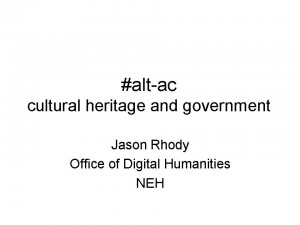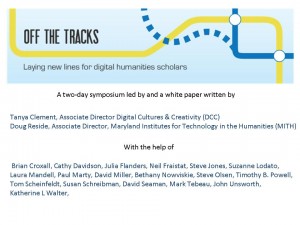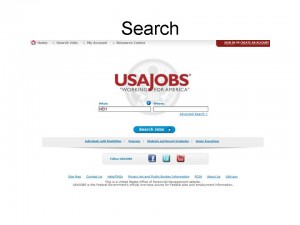The following slides and notes guided my presentation for the #alt-ac: The Future of ‘Alternative Academic’ Careers roundtable at the 2012 MLA convention in Seattle.  I was grateful to be invited by the MLA Office of Programs, and pleased to join Bethany Nowviskie (UVA), Donald Brinkman (Microsoft Research), Neil Fraistat (UMD), Robert Gibbs (Univ. of Toronto), Charles Henry (CLIR), and Elliott Shore (Bryn Mawr) for the discussion.  The bulk of the roundtable was organized toward discussion, but we each took about six minutes to discuss alt-ac from our individual perspective.
This panel followed another alt-ac roundtable session which immediately preceded it.  Both were written up by William Pannapacker in the Chronicle of Higher Education.
I say it elsewhere, but it is worth repeating: opinions expressed are those of Jason Rhody and do not necessarily reflect official positions of the National Endowment for the Humanities.
—
Thank you to Bethany and the MLA for organizing this session. Â Concerns about employment for humanities graduates are not new, even for organizations like the NEH.
There was even some alt-ac in 1983, as you can see in this grant made to Noel Stowe with the title “Historians and the Private Sector:: A Graduate Program Preparing Historians for Business Careers” (discovered by Brett Bobley when making some changes to how we categorize our grants).
Fast-forward approximately three decades, and we can point to discussions of employment and professionalization in a slightly different context: digital humanities centers.
In 2010, Tanya Clement and Doug Reside (then both of UMD) hosted the NEH-funded workshop “Off the Tracks—Laying New Lines for Digital Humanities Scholars.†The workshop outcomes are discussed in full in their report (and I suspect that Neil Fraistat will offer some thoughts here as well), but it’s worth noting that alongside the crisis of humanities employment that we also see a shift in the academic ecosystem that supports and works alongside faculty in today’s colleges and universities.
I’m personally interested in this as an ‘alt-ac’er’ myself, and particularly invested in theorizing how we might go about reframing how we think about ‘service’ in and alongside the academy, and, further, how this relates to the rise of the public humanities (a trend we’ve seen a great deal of through the various grants funded in recent history). I’m also particularly keen to discuss how reframing service allows us to uncover these hidden networks of collaboration (with librarians and archivists for example) so often obscured by the myth of the solitary scholar.
I would be happy to talk more about these more theoretical issues during the Q&A, but due to limited time I would like to give a bit more attention to practical advice in looking for work in government service, or…
Given this somewhat tongue-in-cheek title, this might be an appropriate time to remind you that this presentation is a reflection of my own opinion, and does not reflect the opinion or position of the NEH. Disclaimers are one of the things I’ve had to get used to working in government service – and so this serves both as a disclaimer, and also my own caution that alt-ac comes with tradeoffs. I think it’s exciting that these kinds of positions are getting increased attention, and that scholarly societies like MLA and the AHA are working to make them more available, attractive, and rewarding. But I’m also wary of being overly Pollyanna. These are jobs, and no matter how much you love your job, all jobs come with certain challenges and restrictions (again, I’d be happy to talk more about that later).
So, here are a few tips as you consider alt-ac employment. Â I hope you find them useful whether you are a current graduate student, currently seeking employment, or an advisor how might help students look for these kinds of jobs in the future.
Prepare–early!

Search for government jobs at http://www.usajobs.gov/. Â You can search by keyword, but also try searching by agency (NEA, NEH, NSF, IMLS, Smithsonian, NHPRC, NARA, LOC). Â Â Explore working for the government while still in school (http://www.studentjobs.gov/) or consider opportunities such as the Presidential Management Fellows program (https://www.pmf.opm.gov/).
Customize
What were KSAs?  The acronym stands for Knowledge, Skills and Abilities, which were essay statements that were frequently required along with a resume when applying for government jobs. KSAs are no longer officially used, per se, because of changes in hiring practices during the Obama adminstration. However, many Human Resources offices – which is usually the first group that evaluates all incoming applications up until they draw up a short list for the ‘selecting official’ – have been using KSAs for decades, and that just doesn’t go away (as you can see under “how you will be evaluated†in the slide below).  Instead, KSAs are often reintroduced (though not by name) through a questionnaire often required during the application process.  Be sure to check the advertisement for a sample questionnaire so you can prepare your answers early.
Finally…
One Response to #alt-ac in cultural heritage & government organizations
Leave a Reply
Archives
- February 2016
- April 2014
- March 2014
- April 2013
- March 2012
- January 2012
- March 2011
- February 2011
- February 2009
- January 2008
- September 2007
- June 2007
- May 2007
- April 2007
- March 2007
- February 2007
- January 2007
- December 2006
- November 2006
- October 2006
- September 2006
- August 2006
- July 2006
- June 2006
- April 2006
- March 2006
- February 2006
- January 2006
- December 2005
- November 2005
- October 2005
- September 2005
- August 2005
- July 2005
- June 2005
- May 2005
- April 2005
- March 2005
- February 2005
- January 2005
- December 2004
- November 2004
- October 2004
- September 2004
- August 2004
- July 2004
- June 2004
- May 2004
- April 2004
- March 2004
- February 2004
- January 2004
- December 2003
- November 2003
- October 2003
- September 2003
- August 2003
- July 2003
- June 2003
- May 2003
- April 2003
- March 2003
Categories














[…] Rhody, “#alt-ac in cultural heritage & government” January 11, […]